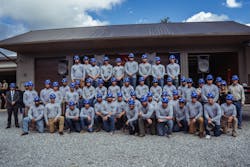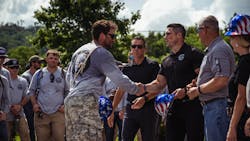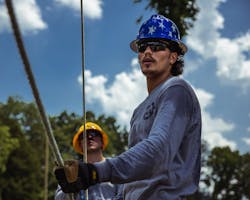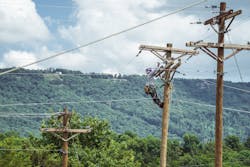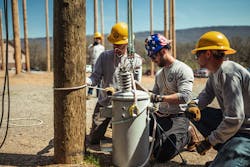With an older brother in the Marines, a sister in the U.S. Air Force and a brother in the line trade, Abdou was drawn to a career in the military and the line trade. Not all veterans, however, discover the wealth of opportunities in line work as soon as they transition into the civilian world.
Tara Buckley, who served as a firefighter for almost eight years in the U.S. Air Force, worked in the trucking industry for years before the apprenticeship. “When I was 18, I joined the military to help people, and I feel like I was born to do that,” Buckley says after a long night restoring power with her line crew. “Now I found something I love. I just worked for 11 hours after a storm, and I came back and was happy to be back at work at 6:30 a.m.”
Every year, about 200,000 men and women transition out of U.S. military service and into civilian life, according to the U.S. Department of Labor. With 23,300 job openings for installers and repairers projected each year, the electric utility industry is opening its arms to military veterans in the line trade.
“There’s an unlimited number of opportunities,” says Jared Anders, marketing director for Southeast Lineman Training Center (SLTC) in Trenton, Georgia. “Every utility in the electrical and communications industries are looking for linemen, and there’s a huge need. Our infrastructure is aging on the electrical side, and it’s growing exponentially on the communication side, and so there’s a ton of work that needs to be done.”
Land of Opportunity
With a wave of retirements in the electric utility industry, the time is now for veterans to enter the line trade, says Jonathan Harmon, executive director of the Utility Workers Union of America (UWUA) Power4America Training Trust Fund in Michigan. This year, Power4America, which trains students in electric, gas and renewable energy industries at its 15-acre training center, is set to graduate its 1000th veteran from the training program.
“There was a graying of the workforce 10 years ago, and I’ve only seen that increase over the last year, especially as the economy is in flux,” Harmon says. “You’re seeing more and more individuals retire, and some of them are leaving with 30 to 35 years of experience. We need to find the next generation of line workers.”
As of this moment, more than 3,500 open positions related to line work are available on the industry’s GetIntoEnergy.org job board, says Rosa Schmidt, director of member services and veterans programming for the Center for Energy Workforce Development (CEWD).
“Across the industry, there are more than 9,500 job openings at this time — a number we expect to steadily increase,” Schmidt says. “We have not seen this many job openings in years. The need for lineworkers has increased due to grid modernizations and retirements. We need to replace some of those retirees with experienced workers to reduce the time to proficiency and to support company requirements.”
Schmidt says the industry is facing a workforce challenge at a time of unprecedented change. “Over the next 10 years, in addition to the growth of jobs in the industry, we must replace large numbers of employees who will retire or leave for other reasons, but the jobs and skills for some of these positions may change during that time,” she says. “We will need employees who have strong technical skills for the jobs now but have the ability to change and adapt as the future of energy unfolds.”
As of 2021, about 8% of the energy industry’s workforce was comprised of veterans compared to 5.3% of veterans employed in the national workforce. The popularity of veterans’ employment in the energy industry is not accidental, Schmidt says. “Energy employers seek the training, experiences, work ethic and leadership offered by those who have served in the military,” she says. “The nation’s energy industry recognizes that veterans have spent their military careers protecting
national security and are, among many things, battle-tested, self-motivated and safety-conscious — traits that translate well into a career in the energy industry.”
In his experience, Harmon says veterans are successful in the line trade for three key reasons — they’re drug-free, they show up to work on time and they know the importance of safety. “They show up early, leave late and are not afraid to go out and work.”
Anders agreed, saying veterans and those still serving in the military can find opportunities in the line trade due to their experience, leadership and work ethic. “Whatever branch they’ve served in, veterans have a lot of drive and dedication, and they understand teamwork and the importance of working together as a crew. All this rolls directly into line work and the idea of being your brother’s and sister’s keeper.”
Troy Ross, a U.S. Army veteran and underground network specialist at Duke Energy, says military veterans know how to lead, but they alos know how to follow. “In the industry, sometimes you may have to play a leader role, and sometimes, you have to follow and take orders. Military people have a get it done attitude, no matter what the job is.”
Doug Akins, customer delivery supervisor for Duke Energy, says Duke Energy values its military veterans like Ross. “When I see an applicant who is a veteran, I know that shows life experience. They have previous work experience in the military and these applicants come with great training from the military.”
Military experience translates well to line work, which is both mentally and physically challenging, Akins says. “During the summers in Florida there could be dangerously hot weather, while working up north brings freezing temperatures. Imagine the extremes of hurricanes and blizzards. It’s not a desk job.”
Transitioning into the Civilian World
Helping veterans to transition into a second career is the best way to support those who have served the country, Schmidt says. Case in point; CEWD launched a Troops to Energy Jobs initiative, which helps veterans and members of the National Guard and Reserves make a successful transition into a rewarding career in the energy industry.
As thousands of experienced veterans leave active duty, many have skills that are a match to skills required for utility technicians, plant operators and engineers. After additional training, such as in the line trade, thousands more can fill positions. Also, on the business side of the industry, veterans can fill spots as accountants, designers, IT professionals, cybersecurity experts and back-office employees, she says.
Another program that is helping military veterans to transition to civilian careers is the Department of Defense’s SkillBridge program. In the last 180 days of service, the DOD connects service members with industry training, internships or apprenticeships so they can gain valuable real-world experience.
Recently, Power4America has been building up its Skill Bridge program to help individuals in the process of separating. “It gives them the opportunity to experience what a career in the utility industry, especially on the lines, would look like, and how that could be beneficial to them as they are coming back home,” Harmon says. “It’s exciting that the military is positioning its soldiers for a life outside the military so they’re ready to go out and be a productive worker in the civilian sector.”
By reviewing the military occupation code of the students and their responsibilities in the service, Power4America can determine how those skills align with careers that exist in the industry. Then, it can make member companies aware of individuals who are transitioning out of multiple military branches who might be a good fit for them.
SLTC also recently got certified as a SkillBridge program, and this year, 58 active-duty students trained at SLTC. “That program is absolutely incredible because they get the training they need before they get out, so there is even a smaller gap or no transition for them,” Anders says. “The day they are hired could be their last day in the military, which is very exciting. Once they finally transition out, they’ve already got the education needed to enter that career, so it’s a very seamless transition.”
When Buckley exited from the U.S. Air Force in 2006, the DOD had not yet launched the SkillBridge program, which was piloted in 2011. “I think that the SkillBridge program is phenomenal — and the fact that you get paid on duty to go to school — I wish that had been brought up years ago,” Buckley says.
Ross concurs. He remembers applying for unemployment when he exited from the Army at 20 years old and landing a job as a corrections officer. “I had no direction whatsoever when I got out of the Army, and that was incredibly difficult. It was a pretty decent job as far as the pay, and it had a lot of the structure like the military, but it was not something that I wanted to do for the rest of my life.”
Having access to a program like SkillBridge would have erased some of the uncertainties and relieved a lot of the stress back then, he says. “A lot of times, when people get out of the service, they don’t have a plan, and the number one thing on their minds is what they are going to do to make a living. I think the utility companies offer not just a job, but a very good career.”
Tyler Klemas, a Duke Energy employee who exited the Marines in 2010, says he wished he would have known about the opportunities in the line trade when he exited the Marines in 2010. Following his one-week transition period from the Marines, he decided to do what the majority of other infantrymen do, pursue a career as a police officer.
“My mindset was that I was a machine gunner, and there’s not a whole lot of civilian jobs that translate to that. But knowing what I know now, I wish I would have known about the possibility of line work.”
Today, veterans who are in the process of separating from the military, can participate in transition programs. For example, as a Marine, Abdou participated in the Transition Readiness Seminar (TRS), where he learned everything he needed to become a civilian — from interview skills, to writing a resume to applying for schools. He could then select from different tracks including college, entrepreneurship or the trades. Through the SkillBridge program, he could enroll at SLTC to get a jump on his training to become a lineman.
On May 3, 2022, he left the Marine Corps, and two days later, he arrived in Trenton, Georgia, and joined the class at SLTC. While he says it took a lot of paperwork and approvals to be able to participate in the SkillBridge program, it was well worth it.
“I will exit active service while I’m here, and I have 16 days left,” he says. “I think the SkillBridge program is a fantastic opportunity, and that’s what I’m on here now—allowing me to come here every day and train.”
Learning to Work on the Line
Twenty years ago, the Veterans Administration certified the SLTC to train veterans through the GI Bill, and in that first year, SLTC has trained 186 veterans. Fast forward to today, and SLTC has already enrolled 146 from just two electrical and two communications classes and trained thousands of veterans over the past two decades. The Post-9-11 GI Bill can cover 100% of the program costs at SLTC, including a $240 stipend for books and supplies.
“We wanted to open the doors to individuals who have served our country to enter the trade by taking away those financial barriers that may prevent someone from going into this industry and getting the training they need,” Anders says.
When military veterans enter the line trade, they are often physically fit for the job, but they seek knowledge of the utility space, Anders says. For example, they often need to learn how to safely climb a pole and the rules and regulations of working around live electricity, Anders says. SLTC also trains students how to safely operate drones in the line trade. “They’re all looking for a job and that security that comes with a job in the utility industry,” he says. “We want to do everything we can so that when they leave our program, they are the best as they head out to their careers.”
For Buckley, her training at the SLTC was the first time she had ever climbed a utility pole, as is the case with many of the veterans who attend the training program. Fortunately, she had a female pole mate next to her, and they kept each other going, she says. “They put us in the same class, which I was really glad about,” she says. “If it hadn’t been for her, I don’t think I would have made it through the class. I came away from there with so much knowledge, and I’m still learning on the job.”
Abdou, who had learned how to climb a pole from his brother, who works in the line trade, says he survived the Marines Boot Camp at Parris Island in July in South Carolina, but Georgia has a different kind of heat.
“In the Marines, I was pushed to the limit of being comfortable, but this is definitely different than anything I’ve ever done. Going up and down the poles for nine hours, with the gaffs sitting right on the arch of your feet, you work muscles you didn’t even know you had.”
SLTC educates students on every aspect they’ll need to know going out in the field so they can work safely and continue on in an apprenticeship, Anders says. Once the veterans enter the training program, they train alongside every other student.
“They blend right in, and on an average day during the first couple weeks of class, you walk on our campus, and you wouldn’t be able to tell who the veterans are,” he says. “But usually, at about week six of our training programs, we have a hard hat ceremony for our veterans. It reminds the staff and the other students how lucky we are to have people who served our country here with us. Hopefully, it also makes them feel a bit more appreciated for everything they have done.”
When they finish the 15-week electrical training program, the veterans and active-duty military come out with a knowledge of electricity, career planning, how to climb a pole and operate a bucket truck and crane. They also earn their Class A Driver’s License.
“Many people will hire our students coming out of the electrical program, basically giving them credit for the first year of their apprenticeship,” he says. “Usually, they’ll only have three more years out of that, so it’s a great perk turning 15 weeks of training into a year’s worth of an apprenticeship. They have the opportunity for an incredible career where they can be making $60,000 to $70,000 early on, and it can just go up from there.”
By training for a career as a lineman, it sets up military veterans for a career with no debt, Anders says. “College debt averages about $34,000 to $35,000, but when the majority of our veterans come to our program, they can walk away without any debt and are able to go start their career immediately,” he says.
As an apprentice lineman and military veteran, Buckley has the power to earn a high-paying salary with no college degree and no college debt. She says she wishes America did a better job of promoting the opportunities in the trades. “We are expected to learn a certain way and not everybody learns that way,” she says. “I think the country falls very short in trying to figure out how people learn and how to push them in a different way.”
Harmon agreed, saying when military veterans land a job with a utility company, it can lead to a life-long career in the line trade. “For a really long time, I think what we promoted across the country is the fact that you couldn’t get a good paying job without having some kind of college education,” he says. “In reality a good paying job and career can be found in the trades. Utility jobs are a secret in that they are a path to a middle-class lifestyle. It’s an opportunity to own a home, have a retirement, get benefits and help your kids go to college.”
Moving into the Trade
When the veterans graduate from SLTC, they end up in careers in many different sectors of the utility world.
In Anders’ experience, seasoned veterans prefer settling down in one location, while younger veterans more willing to move around and work with companies traveling for storms.
Abdou, the 22-year-old Massachusetts native, says the contractor life is more appealing. “My brother, Johnny, works for a contractor, and he loves it,” he says. “They are hard charging every day and they don’t take many breaks. In the Marine Corps, you call it running and gunning, which means you go, go, go. That’s what you train for, that’s what I’m used to and enjoy.”
Anders says recruiters come to every class, and sometimes, they specifically want to speak to the students who are veterans for many reasons. “The biggest thing is that they know what type of worker they are going to get if they hire a veteran,” he says. “They know they’re going to serve them at a whole different level, which is really exciting and encouraging.”
To get the word out about opportunities, an SLTC recruiter and Army veteran travel through the country to military bases to meet with veterans at transition fairs to meet with make them aware of the opportunity to train for a career in the line trade.
“Training as a lineman is a great way to get paid and continue to serve your country,” Anders says. “We’ve seen a peak enrollment with that, which is really exciting, just knowing that we can serve them after they have served us.”
To recruit veterans, Harmon advised utilities to visit the military bases and consider partnering with the Department of Defense and Veterans Affairs to promote the fact that jobs exist in the electric utility industry. “Not a day goes by when I’m not receiving some kind of interest from a veteran who is going to be exiting and wants to know more about how to get into an electric or gas career with one of our employers,” he says. “It’s encouraging that they’re actively looking for employment.”
Hiring Veterans
Because employees must self-disclose that they served in the military, many utilities may not be aware just how many veterans currently work for them, Harmon says.
“We’re shocked at how many people in the utility industry have served in the military, and utilities are starting to realize that they have a lot of veterans working for them,” Harmon says. “They’re coming out and sharing their experiences and having a sense of pride about serving their country.”
One utility that is actively hiring and employing veterans is Duke Energy. The company, which provides energy to seven million customers in six states, currently employs more than 2,000 military veterans and has an annual goal of hiring at least 14 percent of its employees from the military.
For its commitment to veterans, the utility has won several awards including the HIRE Vets Gold Medallion Award and the American Veterans Veteran-Friendly Employer of the Year award. In addition, the Secretary of Defense awarded Duke Energy with the Secretary of Defense Employer Support Freedom Award, which is only given to 15 companies each year out of 2,300 nominations.
“It is the highest honor that the Department of Defense gives to companies for their outstanding support for employees who serve in the National Guard and Reserves,” says Klemas, a senior business system specialist at Duke Energy.
Duke Energy recently increased the number of hours of annual leave with full pay for National Guard and Reserve members from 80 hours to 120 hours. The utility also supports its military employees in other ways.
“Some of our folks from Duke Energy were getting on a plane to go overseas, and Duke Energy came out and brought line trucks to show support with a big American flag hanging off of it,” he says. “They didn’t have to do that, but that they put forth the extra effort was outstanding.”
As veterans move into the energy industry, they will likely notice some strong similarities, he says. While everyone in the Marines or at a utility company has a different mission, their main objective is to support those in the field — whether they are linemen or infantrymen.
At Duke Energy, Klemas has assisted the lead military and veteran recruiter at Duke Energy at recruiting events, and he now serves as the vice chair of Together We Stand, a Charlotte, North Carolina, Employee Resource Group (ERG) comprised of veterans and their family members and patriots. The group is responsible for bringing a three-quarter replica of the Vietnam Veterans Memorial Wall from Washington, D.C. to the Charlotte Motor Speedway this October. The members also volunteer in the community by serving lunch at homeless shelters and providing support for veterans working for Duke Energy.
“When someone gets hired, and they’re asked if they are a veteran, they can put us in touch with that new hire,” he says. “From day one, they’re going to have a support system who’s made up of people from all across the company — from linemen to vice presidents.”
Klemas encourages veterans to look at careers in the energy industry, and he says it’s imperative to get the word out there about careers in the line trade.
“If you are in the military, look at line work,” he says. “Whenever I talk to veterans, whether they were infantry or not, I tell them there’s somewhere in that puzzle that they will fit. There are so many opportunities out there.”
Anders of SLTC says by raising awareness of the oppor-tunities in line work for veterans, it can give them a direction and a purpose when they transition out of the military. “They’ve put their lives on the line, and they are coming back and looking for ways to continue to serve our country,” he says.
Following a day of training at SLTC in Georgia, Abdou says the transition from a military to a civilian lifestyle can be difficult, but he is looking forward to working in the line trade. After graduating from SLTC, Abdou plans to start out in the line trade as an apprentice and then top out as a journeyman lineman and teach the next generation that comes after him. “I don’t think it’s completely hit me yet that I’m not going to put that Marines uniform on again,” he says. “I think working on a line crew can help fill that in your heart.”
Editor’s Note: To hear the voices of the veterans who are now working in the line trade, listen to the September 2022 Line Life podcast.
Four Ways to Recruit Veterans for the Line Trade
By working as linemen, military veterans can continue to serve their communities in the civilian world. Rosa Schmidt from the Center for Energy Workforce Development shares these four strategies for employers to promote job opportunities and connect with veterans actively searching for careers in the line trade.
- Partner with community colleges and technical schools to develop lineworker certificate programs. Many of these programs are already available across the United States, and they’re available to veterans and transitioning service members.
- Reach out to Transition Assistance Program (TAP) offices on bases. With this approach, you can raise awareness of the careers in the industry and find potential candidates for positions.
- Participate in the SkillBridge program. Electric utilities and line contractors can bring transitioning service members into the company as interns during the transition period, allowing them to learn and be hired upon discharge from the military.
- Connect with local veteran organizations. This is a great way to raise awareness, Schmidt says.
Supporting Veterans’ Transition into the Energy Industry
- Helmets to Hardhats (www.helmetstohardhats.org) is a national, nonprofit program that connects transitioning active-duty military service members, veterans, National Guard and Reservists with skilled training and quality career opportunities in the construction industry.
- Department of Defense’s SkillBridge program (https://skillbridge.osd.mil/) connects Service members with industry partners in real-world job experiences.
- Troops to Energy Jobs (www.troopstoenergyjobs.com) helps veterans transition into careers in the energy industry through a virtual roadmap, job board and career coaching.
About the Author
Amy Fischbach
Electric Utilities Operations
Amy Fischbach is the Field Editor for T&D World magazine and manages the Electric Utility Operations section. She is the host of the Line Life Podcast, which celebrates the grit, courage and inspirational teamwork of the line trade. She also works on the annual Lineworker Supplement and the Vegetation Management Supplement as well as the Lineman Life and Lineman's Rodeo News enewsletters. Amy also covers events such as the Trees & Utilities conference and the International Lineman's Rodeo. She is the past president of the ASBPE Educational Foundation and ASBPE and earned her bachelor's and master's degrees in journalism from Kansas State University. She can be reached at [email protected].
